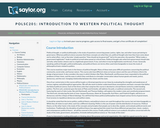
Political thought, otherwise known as political theory or philosophy, is the study of questions concerning power, justice, rights, law, and other issues pertaining to governance. This course examines major texts in the history of political thought and asks how different views on human nature inform the design of government. Upon successful completion of this course, the student will be able to: summarize the passage of political thought through the classical, Renaissance, and Enlightenment periods and based on the works of Plato, Aristotle, Machiavelli, Hobbes, Locke, Rousseau, Tocqueville, and Marx; compare and contrast the differences between Plato and Aristotle with regard to their understandings of the nature of the person, ethics, society, citizenship, and governance; explain the historical and intellectual context in which the political thought that helped to develop the modern state came to be; compare and contrast the concepts of justice, freedom, equality, citizenship, and sovereignty in the works of Machiavelli, Hobbes, Locke, and Rousseau; explain the different versions of, and importance of, 'the state of nature' to political thought; identify the influences of Hobbes, Locke, and Rousseau on the development of the United States Constitution; summarize the thoughts of Alexis de Tocqueville on the American political landscape, particularly with regard to religion and equality, and why this has importance beyond the American context; explain Karl Marx's world view, with particular regard to his critique of democracy and the modern, politically liberal, state; how it came to be; and its fundamental link to capitalism. (Political Science 201)
- Subject:
- Arts and Humanities
- Philosophy
- Political Science
- Social Science
- Material Type:
- Assessment
- Full Course
- Lecture
- Lecture Notes
- Reading
- Syllabus
- Provider:
- The Saylor Foundation
- Date Added:
- 11/21/2011
